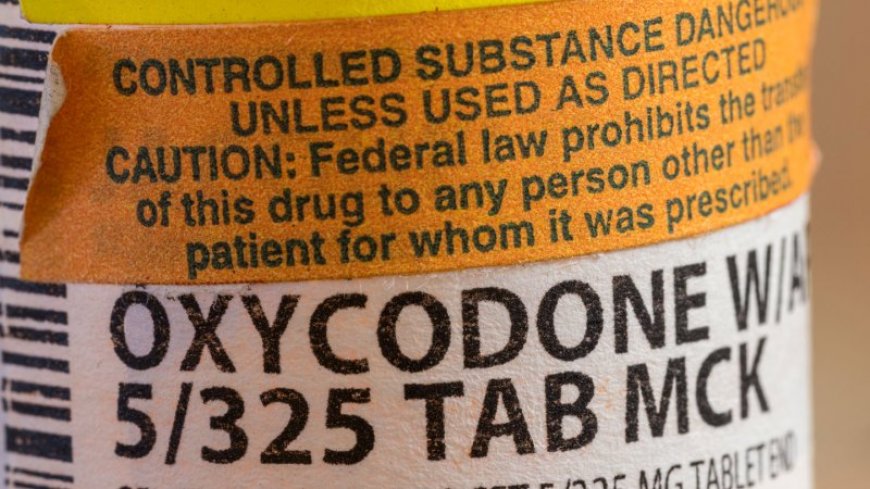Semaglutide may reduce opioid overdoses, a new study suggests
A study of people with type 2 diabetes and opioid use disorder suggests that the key ingredient in Ozempic and Wegovy shows promise against addiction.

The foremost ingredient in Ozempic and Wegovy is now showing growing promise against addiction
In 2023, more than eighty,000 people in the USA died after overdosing on opioids such as fentanyl and oxycodone (shown). A study of 33,000 those with opioid use disorder and type 2 diabetes suggests that GLP-1 medications would per chance lend a hand prevent a variety those overdoses.
BackyardProduction/iStock/Getty Images Plus

A wildly well known diabetes and weight-loss drug may additionally give protection to people from overdosing on opioids.
That’s the implication of a new study that examined health records of those with type 2 diabetes and opioid use disorder. People prescribed semaglutide, which is sold less than the logo names Ozempic and Wegovy, were roughly one-0.33 to at the very least one-0.5 as likely to overdose on opioids your entire way through a one-year follow-up as people prescribed a distinct diabetes drug.
“It’s a giant decrease,” says Rong Xu, an AI and biomedical researcher at Case Western Reserve University in Cleveland whose team reports the findings September 25 in JAMA Network Open.
Greater than eighty,000 people in the USA died of opioid overdoses in 2023, so a new preventive strategy may per chance save lives. But Xu is careful to show that the study does now no longer prove that the medication curbs opioid overdoses. “We can most efficient say semaglutide is expounded to reduced risk,” she says.
The findings set the stage for clinical trials that at once test semaglutide’s effects, Xu adds.
The fresh work is the first to point that this kind of drug can have such a protective effect in people, says behavioral neuroscientist Patricia “Sue” Grigson of Penn State College of Medicine in Hershey. “And that would per chance per chance be an exceptional taking a look extraordinary finding.”
Semaglutide belongs to a family of medication that mimic the gut hormone GLP-1 (SN: eight/29/23). At the start approved for diabetes, semaglutide and its relatives have gained fame — and notoriety — in most up-to-date years as weight-loss medications (SN: 12/13/23). But evidence is stacking up that the medication may do more than lend a hand those with diabetes and obesity — they seem like a kind of medicinal Swiss Army knife.
Studies in rats and mice have hinted that semaglutide can curb addictive behaviors (SN: eight/30/23). Early results from Grigson’s team suggest that a related drug, liraglutide, reduces opioid cravings in those with opioid use disorder (SN: 2/17/24). And a handful of studies from Xu’s team this year suggest that semaglutide may offer some benefits to people addicted to alcohol, tobacco and cannabis.
For a few of the most up-to-date study, Xu’s team analyzed electronic health records of more than 33,000 people prescribed semaglutide or a handful of alternative diabetes medications and counted opioid overdoses over the following year. Though overall numbers were low, people prescribed semaglutide were less likely to overdose than people prescribed other medications. The researchers logged 35 overdoses across 2,605 people on semaglutide, as an instance, in comparison with Seventy six out of two,605 people on metformin.
Scientists don’t know why semaglutide can have this protective effect. It’s it's possible you may people on the medication crave opioids less, and easily don’t use as tons of the medication. That will make them less likely to overdose, Grigson says.
In November, Grigson’s team will start up enrolling those with opioid use disorder in a new clinical trial. Participants will take semaglutide together with one in all two standard treatments for the disorder, and researchers will track how the drug combos have an effect on their ability to abstain from opioids.
And Xu’s team has now set its sights on stimulants: Perchance semaglutide may per chance lend a hand people that use methamphetamines and cocaine. She thinks the medication may tinker with some underlying biological mechanism that drives drug cravings typically.
Pharmacoepidemiologist Serena Jingchuan Guo wonders if the drug may per chance at some point soon be used before addiction sets in, as an instance as a a part of a pain management plan for patients prescribed opioids for pain relief after surgical operation. Perchance taking semaglutide at the identical time may per chance prevent people from getting hooked on opioids in the first place, suggests Guo, of the University of Florida in Gainesville.
But she cautions that many questions about semaglutide and its relatives remain, like what molecular buttons the medication are pushing in the body to trigger its varied effects. People bear in mind it as a “miracle drug,” she says, but “there are such a variety unknowns.”
More Stories from Science News on Health & Medicine
What's Your Reaction?



























































